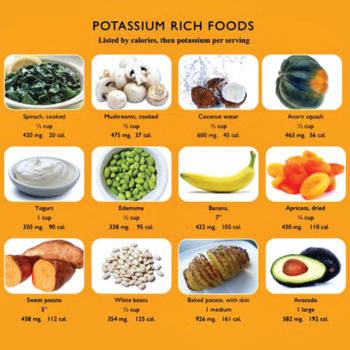 Nancy Teeter, RDN
Nancy Teeter, RDN
K+ is the chemical symbol for potassium, a vital nutrient in human nutrition. My article in last month’s paper focused on the role of sodium in blood pressure regulation and listed five tips to help reduce sodium intake. I also briefly touched on potassium’s role in blood pressure management. My goal for this article is to inform you about the many roles potassium plays in your good health. Our ancestors ate ten times more potassium than sodium, but with today’s Standard American Diet (SAD) this ratio is reversed.
Potassium is present in all beans, legumes, vegetables, fruits, fish and meat, but it is estimated that just two percent of Americans have the Adequate Intake (AI) of 4,700 milligrams. Some people with compromised kidney function may be advised by their doctors to consume less.
Bone Health: At least four studies have shown that a potassium-rich diet may reduce risk of osteoporosis and bone fracture.
Heart Health: As an electrolyte, potassium counteracts the effects of sodium, which can help keep your blood pressure in a recommended range. Low potassium is regularly linked to cardiovascular disease and high blood pressure.
Stroke: Several large studies have suggested that increased potassium intake is associated with a decreased risk of stroke. This is likely due to the role potassium plays preventing blood clots.
Kidney Stones: Abnormally high urinary calcium increases the risk of developing kidney stones. A study of more than 45,000 men found that those whose potassium intake averaged more than 4,042 milligrams per day were only half as likely to develop symptomatic kidney stones as men who had significantly lower intake levels.
Rheumatoid Arthritis: A study completed in 2008 suggests that an intake of 6,000 milligrams daily of potassium reduces pain from RA. One serving of every food listed in the accompanying chart could provide nearly that amount along with just 1,148 calories.
Risk of Potassium Supplements: You can’t get too much potassium from food but supplementing with high levels of potassium can be dangerous. Unless prescribed by your doctor, avoid supplements containing more than 99 milligrams of potassium.
Nancy Teeter, a registered dietitian nutritionist, is SaddleBrooke resident.
